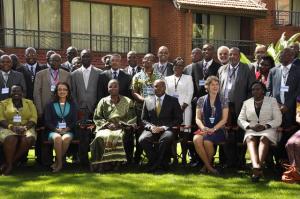Kenya hosts commemoration to accelerate comprehensive implementation of WHO FCTC in the African Region
Nairobi, 25 February 2015 -- The WHO meeting to commemorate the implementation of the Framework Convention on Tobacco Control (FCTC) started in Nairobi today with members and participants commending great milestones but cautioning that a lot is still needing to be done to save lives from the tobacco epidemic.
The meeting attended by Member States outlines the implementation status for each state and what still remains to be done to protect African citizens from tobacco use and tobacco-related deaths.
Forty-three of the 47 member states have ratified the convention, with Eritrea, South Sudan and Malawi yet to ratify. Mozambique is a signatory. The meeting which was addressed by various speakers also commended and welcomed new members, Ethiopia and Zimbabwe.
WHO Regional Director Dr Matshidiso Moeti, in her speech read on behalf by Kenya’s Country Representative, Dr Custodia Mandlhate, said that tobacco, a leading cause of death, illness and impoverishment, was one of the biggest public health threats the world has ever faced and kills nearly six million people every year.
She highlighted that “more than five million of the referred deaths were the result of direct tobacco use while more than 600 000 are the result of non-smokers being exposed to second-hand smoke”.
Approximately one person dies every six seconds due to tobacco, she added, and nearly 80% of the more than one billion smokers worldwide live in low-and middle-income countries, where the burden of tobacco-related illness and death is heaviest.
Calling on countries to action, Dr Moeti noted loss of life through tobacco use was preventable. “We cannot continue to witness passively tobacco users losing their lives prematurely, depriving their families of income while raising the cost of health care, and impacting negatively on the overall economic development.”
She commended the 43 countries in the African Region for signing and implementing the WHO FCTC that unanimously passed as the first public health treaty in 2003. She acknowledged implementation of the FCTC was not easy due to various challenges faced by the Member States but urged governments to renew political commitments and allocate adequate resources for implementation of the Convention.
She also called on partners to increase their support and the civil society to continue raising awareness in their respective communities. Addressing participants, Kenya’s Cabinet secretary Mr. James Macharia commended members for taking action to contain the tobacco epidemic through ratifying WHO FCTC.
“We cannot relent in the efforts we have put so far to resist the temptations they use to lure our people to consume products that kill half of its users when used as intended by the manufacturers.”
His speech was read by Kenya director of Medical Services, Dr Nicholas Muraguri.
Mr Macharia demonstrated commitment to the implementation of the FCTC by domesticating and putting in place mechanisms including the enactment of the Tobacco Bill in 2007. Initiatives towards a tobacco-free Kenya had led to decline in tobacco use. The Global Youth Tobacco Survey had shown a decline from 15.1 % in 2007 to 9.9 % in 2013 among youth.
He urged members to recognize emerging trends in tobacco use including illicit trade, emerging new products, low and stagnant cost of tobacco products, and intimidation and threat by the tobacco industry.
“We should not be cowed to retreat or fear to put in place stringent measures to curb the tobacco epidemic,” he urged.
Dr Vera Luiza da Costa e Silva, Head of Convention Secretariat, pledged to work with the WHO AFRO office and country offices to support the Parties in the Region to fully implement the Convention.
She called on Member States to be more vigilant regarding interference by the tobacco industry, which aimed at delaying and diluting measures to implement the Convention. The industry she said also worked against national legislation, used front groups and tobacco growers to make their case, and lobbying decision-makers and legislators, she added.
“Tobacco growers are the weak part of the tobacco chain and should be supported with opportunities of alternative livelihoods and not used against public health measures”, she said.
____________________________________
For more information, please contact:
Technical contact:
Dr Joyce Nato; Tel: +254 722 509 403/+254 020 271 7902; Email: natojo [at] who.int
Media contacts:
Dr Jemimah Mwakisha; Tel: +254 722 509 403/+254 020 271 7902; Email: mwakishaj [at] who.int
Dr Cory Couillard; Tel: +472 413 9995; Email: couillardc [at] who.int



